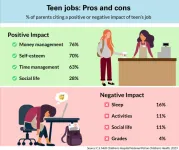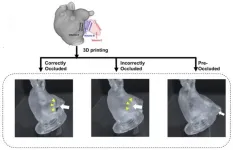(Press-News.org) PULLMAN, Wash. – Discovery of a gene in multiple mammalian species could pave the way for a highly effective, reversible and non-hormonal male contraceptive for humans and animals.
Washington State University researchers identified expression of the gene, Arrdc5, in the testicular tissue of mice, pigs, cattle and humans. When they knocked out the gene in mice, it created infertility only in the males, impacting their sperm count, movement and shape. The researchers detailed their findings in the journal Nature Communications.
“The study identifies this gene for the first time as being expressed only in testicular tissue, nowhere else in the body, and it’s expressed by multiple mammalian species,” said Jon Oatley, senior author and professor in WSU’s School of Molecular Biosciences. “When this gene is inactivated or inhibited in males, they make sperm that cannot fertilize an egg, and that’s a prime target for male contraceptive development.”
While other molecular targets have been identified for potential male contraceptive development, the Arrdc5 gene is specific to the male testes and found in multiple species. Importantly, lack of the gene also causes significant infertility creating a condition called oligoasthenoteratospermia or OAT. This condition, the most common diagnosis for human male infertility, shows a decrease in the amount of sperm produced, slowed mobility and distorted shape so that the sperm are unable to fuse with an egg.
In the WSU study, the male mice lacking this gene produced 28% less sperm that moved 2.8 times slower than in normal mice – and about 98% of their sperm had abnormal heads and mid-pieces.
The study indicates that the protein encoded by this gene is required for normal sperm production. Oatley’s team will next work on designing a drug that would inhibit production or function of that protein.
Disrupting this protein wouldn’t require any hormonal interference, a key hurdle in male contraception since testosterone plays other roles beyond sperm production in men including building bone mass and muscle strength as well as red blood cell production. Designing a drug to target this protein would also make it easily reversable as a contraceptive.
“You don't want to wipe out the ability to ever make sperm – just stop the sperm that are being made from being made correctly,” he said. “Then, in theory, you could remove the drug and the sperm would start being built normally again.”
Oatley and study first author Mariana Giassetti have filed a provisional patent for the development of a male contraceptive based on this gene and the protein it encodes.
Because the gene is found across mammalian species, this knowledge also holds promise for use in animals, Oatley said. The team analyzed available biological data on DNA and protein sequences in mammals and found the gene in almost every known mammal species. This opens the potential to develop male contraception for use in livestock, perhaps replacing castration in some instances as a way to control reproduction, and in wildlife when managers seek to limit overpopulation of a species.
The initial focus, however, is on giving humans more control over their own reproduction. While there are many forms of birth control for women, they are not always effective or widely available, and more than half of pregnancies worldwide are still unintended, according to the United Nations.
“Developing a way to curb population growth and stop unwanted pregnancies is really important for the future of the human race,” said Oatley. “Right now, we don't really have anything on the male side for contraception other than surgery and only a small percentage of men choose vasectomies. If we can develop this discovery into a solution for contraception, it could have far-ranging impacts.”
This study received support from the National Institutes of Health and WSU’s Functional Genomics Initiative, a multi-year university investment to support development of genetic technology research.
END
New genetic target for male contraception identified
2023-04-17
ELSE PRESS RELEASES FROM THIS DATE:
The annual report on antisemitism worldwide – 2022: Haredi Jews – The main target of antisemitic assaults
2023-04-17
Embargoed until Monday, April 17th at 11AM (Israel time)
On the eve of Holocaust Remembrance Day
Tel Aviv University in cooperation with the Anti-Defamation League (ADL) presents
The Annual Report on Antisemitism Worldwide – 2022:
Haredi Jews – The Main Target of Antisemitic Assaults
2002 saw another sharp increase in the number of antisemitic incidents in the United States and other Western countries, alongside a decline in several other countries, including France, Germany, and the United Kingdom.
The report found that Haredi Jews are the main victims of antisemitic assaults in the West. Physical attacks, which ...
8.8 million euros for accelerated drug repurposing for rare neurological disorders
2023-04-17
The SIMPATHIC Consortium, led by the Radboud University Medical Center and Amsterdam UMC, has developed a new approach to expedite the use of existing drugs for groups of patients with rare neurological disorders. The consortium has been awarded an 8.8-million-euro grant from the Horizon Europe program to further develop this innovative method.
Traditionally, drugs are developed one disease at a time, which is costly and time-consuming. It often takes a long time before patients can use a new drug. The international ...
Does depression affect the care and survival of patients with breast cancer?
2023-04-17
Study’s findings suggest that detecting and treating depression are critical to patient health.
In a recent study, having depression before or after a breast cancer diagnosis was associated with a lower likelihood of survival. The findings are published by Wiley online in CANCER, a peer-reviewed journal of the American Cancer Society.
For the study, Bin Huang, DrPH, of the University of Kentucky Markey Cancer Center, and his colleagues analyzed data from the Kentucky Cancer Registry to identify adult women diagnosed with primary invasive breast cancer in 2007–2011. Utilizing the health claims–linked cancer registry data, the ...
Teen jobs: Some parents cautious about negative impact on grades, sleep and social life
2023-04-17
For many teens, that first formal job as a fast-food cashier, barista or lifeguard is a rite of passage.
And while some families tout the positives of job experiences, such as improving their teen’s money management skills and self-esteem, others worry about the potential to negatively impact sleep, schedules and grades, according to the University of Michigan Health C.S. Mott Children’s Hospital National Poll on Children’s Health.
But finding a job that meets logistical considerations – with schedules and transportation topping the list ...
ARRS Annual Meeting: 4D flow MRI, 3D phantoms benefit atrial fibrillation patients
2023-04-17
Honolulu, HI | April 17, 2023—Findings from an award-winning Scientific Online Poster presented during the 2023 ARRS Annual Meeting at the Hawaiian Convention Center suggest that correctly occluded left atrial appendages (LAAs) could present maximal reduction in left atrial (LA) flow stasis and thrombogenicity, offering a clinical goal for the procedure in patients with atrial fibrillation.
Pointing out the paucity of knowledge in atrial fibrillation (AF) populations regarding the actual flow dynamic changes before and after percutaneous left atrial appendage occlusion (LAAO), “we aimed to evaluate LA flow dynamics for pre-occluded, correctly occluded, and incorrectly ...
American Roentgen Ray Society (ARRS) Global Partners honor Jeong Min Lee, Korean Society of Radiology (KSR) President, with ARRS membership
2023-04-17
Honolulu, HI | April 17, 2023—The Global Partner Society Program of the American Roentgen Ray Society (ARRS) is proud to announce that Jeong Min Lee, President of the Korean Society of Radiology (KSR) and professor of radiology at South Korea’s Seoul National University Hospital, will receive Honorary Membership in ARRS during the opening ceremony of the 2023 ARRS Annual Meeting in Honolulu, HI.
As per Section 6 of the ARRS bylaws, honorary members of the ARRS shall be those who have rendered valuable service ...
Over 1 million lives saved across Europe by COVID-19 vaccines since the end of 2020
2023-04-17
**Note: the release below is from the European Congress of Clinical Microbiology & Infectious Diseases (ECCMID 2023, Copenhagen, 15-18 April). Please credit the conference if you use this story**
COVID-19 vaccination directly saved at least 1,004,927 lives across Europe between December 2020 and March 2023, according to new research being presented at this year’s European Congress of Clinical Microbiology & Infectious Diseases (ECCMID) in Copenhagen, Denmark (15-18 April).
The new estimates by WHO/Europe and presented at the conference by Dr Margaux Meslé, Epidemiologist at WHO/Europe highlight the striking ...
Long COVID incidence and severity no worse than post viral syndrome following seasonal influenza, study suggests
2023-04-17
**Note: the release below is from the European Congress of Clinical Microbiology & Infectious Diseases (ECCMID 2023, Copenhagen, 15-18 April). Please credit the conference if you use this story**
In the highly vaccinated population of Queensland exposed to the Omicron variant, long COVID appears to manifest as a post-viral syndrome of no greater incidence or severity than seasonal influenza, according to new research being presented at this year’s European Congress of Clinical Microbiology & Infectious Diseases (ECCMID) in Copenhagen, Denmark (15-18 April).
The study by Queensland Health researchers suggests that despite the similarity of clinical outcomes ...
Metagenomic sequencing outperforms conventional tests to identify antimicrobial resistance in bloodstream infections
2023-04-17
Metagenomic sequencing can provide rapid and actionable antimicrobial resistance predictions to treat bloodstream infections much faster than conventional laboratory tests, and has the potential to save lives and better manage the use of antibiotics, according to new research being presented at this year’s European Congress of Clinical Microbiology & Infectious Diseases (ECCMID) in Copenhagen, Denmark (15-18 April).
The study led by Dr Kumeren Govender from the John Radcliffe Hospital, University of Oxford, ...
Effect of COVID-19 pandemic on mortality in people with intellectual disabilities extended beyond deaths from COVID itself
2023-04-17
Mortality from COVID-19 in people with intellectual disabilities five times higher than general population
Study showed death rates for cancers, mental health disorders, circulatory disorders, external causes, and other natural causes in people with intellectual disabilities were higher during the COVID pandemic than pre-pandemic
Observed effects likely to be due a range of factors including disruptions to care during pandemic
PLEASE NOTE Embargo: 0030H CEST Copenhagen time Monday 17 April
*Note: ...



